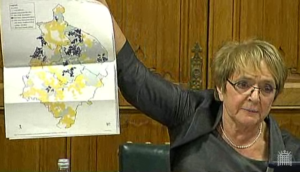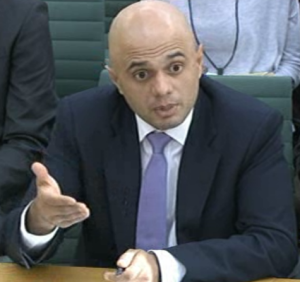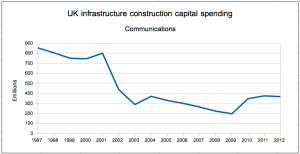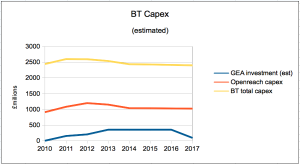Posts Tagged ‘BDUK’
BT gets personal with PAC chair
Under pressure from the Public Accounts Committee to show value for money for the £1.7bn it is receiving for BDUK contracts, BT is fighting back.
Bill Broadband has just retweeted a Guido Fawkes tweet that it will “revisit” PAC chair Margaret Hodge’s tax affairs.
Bill Broadband is one of the names used by BT’s astroturf community to defend BT’s NGA roll-out and intimidate would-be competitors.
Hodge is away and unavailable for comment.
BT to cut BDUK roll-out costs – but it was already 20% cheaper
The National Audit Office (NAO) report on the BDUK’s former Rural Broadband Programme, now renamed the Superfast Broadband Programme, contains elements that might lead to cognitive dissonance.
It reports that BDUK commissioned Atkins, a primary supplier of services to government, to look at BT’s costs to provide high speed broadband in rural areas. After looking at a few sites in Suffolk, Atkins concluded “BT had charged Suffolk nearly 20% less than would hypothetically be charged by another efficient supplier, in part reflecting that BT benefits from substantial national bulk buying power compared with other providers.” Paragraph 3.10)
That’s good news, right? But it seems there’s more joy to come for taxpayers. In Paragraph 5 NAO reports “BDUK’s experience of actual costs in phase 1 has led to BT agreeing to submit lower costs in its financial model for phase 2.”
However, it carefully notes that BT was picking low hanging fruit in Phase 1, namely peri-urban areas rather than deep rural ones where is cost to reach them is likely to be higher, unless you use a satellite.
NAO also suggests BT got other sums wrong. BrOkenTeleph0n3 revealed that BT’s planners estimated BT would break even on a 20% take-up in 12-14 years. “Take-up of superfast broadband so far has been significantly faster than forecast by BT in the phase 1 contracts. Take-up has risen to more than 20% already for two non framework projects”, the NAO found. This “should bring greater coverage than contracted, as local bodies will be able to extend their rollout with remaining funds,” it says.
BT is the only framework supplier left, and 43 out of 47 county councils have opted to use the framework to procure Phase 2, although 10 may elect to hold money back for Phase 3, the final 5%.
“Overall, the effect of the first 2 phases will be to reinforce BT’s already strong position in the wholesale market for broadband infrastructure (the Wholesale Local Access Market). BT’s assets and infrastructure will benefit from approximately £1.7 billion of public sector investment although BT must maintain these assets at its own expense. BT is also required by regulatory conditions to provide wholesale access to other suppliers.”
The NAO also revealed that the public will benefit from clawbacks due to higher than expected take-up for only seven years. “After these seven years, the supplier will keep all of the extra wholesale profit.”
BT amortises its fibre over five to 20 years, and its exchange equipment over three to 13 years.
BTW, in its 2013 rural broadband report on page 35, the NAO said “The Atkins ‘should cost’ model for Northamptonshire is three per cent higher than BT’s actual bid for the area. Atkins was not able to complete analysis of a second local body area, Suffolk, due to the difficulties it encountered in modelling a more complex technical solution. Atkins’ model is the only model available to us that has tried to match a corresponding BT bid identically.”
The hour-long Public Accounts Committee interview on the NAO report, featuring DCMS, BDUK and BT officials, took place on 28 January 2015. You can see the video here.
PAC opens Act 3 of superfast broadband enquiry
There are still some people who are interested in seeing what’s happening to the near £2bn of taxpayers’ money given to BT to roll out next generation broadband in the “Final Third”. Many of them probably sit on the Commons’ Public Accounts Committee, which is taking its third stab at finding if BT is delivering value for money this coming Wednesday.
The PAC, chaired by Margaret Hodge, was previously frustrated by the answers it received (here and here), and vowed to keep asking questions until it was satisfied. BT’s director of strategy, policy and portfolio, Sean Williams, who was the source of much of Ms Hodge’s frustration, gets a third act in front of the committee.
Supporting players are DCMS boss Sue Owen, BDUK CEO Chris Townsend and superfast broadband programme director Andrew Field, and Openreach MD for infrastructure delivery Kim Mears.
In its preamble the PAC said its reports on the rural broadband programme in September 2013 and April 2014 “raised concerns over lack of published information on BT’s plans for superfast broadband coverage, the availability and transparency of cost data and the level of competition secured throughout the programme. This recall session will examine the transparency of cost and rollout information and explore whether the department has done enough to promote greater competition for phases 2 and 3 of the programme.”
The curtain for the hour-long show goes up at 2.15pm on Wednesday 28 January 2015, Committee Room 15, Palace of Westminster. If you can’t make it in person you can follow on Parliament TV: Rural broadband: progress update session.
Javid to break business broadband logjam?
The government is looking at how to get high speed broadband to urban businesses despite state aid rules that appear to preclude using some of the £2bn of BDUK money to do so, culture secretary Sajid Javid told MPs on the Culture, Media & Sport parliamentary committee yesterday.
Javid said DCMS is talking to stakeholders, including the Federation of Small Businesses, which this month produced a second damning report on broadband, to resolve the situation.
Javid also revealed that the contracts between BT and country councils for rolling out “superfast broadband” have claw-back clauses that come into effect when take-up reaches 20%.
Javid added that the government was updating the Electronic Communications Code as part of a deal with mobile network operators to extend mobile coverage to 90% of the UK land mass announced late last year.
The code was outdated and inconsistent with current technology and practice, he said. The required changes are included in the Infrastructure Bill currently before parliament (see here).
In February 2013 the Law Commission recommended changes to provide a clearer definition of the market value that landowners can charge for wayleaves, resolve inconsistencies with other legislation, clarify network upgrade and sharing rights, and establish the rights of land owners and network operators with respect to access to land and removal of equipment, as well as ways to resolve disputes
This link Culture secretary Sajid Javid on the DCMS annual report opens a new window. Javid’s comments on the code are at 12.43, and on broadband at 12.53.
MPs to query rural broadband roll-out

Some farmers who will be able to get their CAP forms in on time dug their own fibre in the B4RN area.
MPs have launched an inquiry into rural broadband speeds following on-going concerns that nearly £2bn of taxpayers’ money is unlikely to produce the expected results.
- the extent of broadband coverage in hardest to reach rural areas
- digital access and experience of digital─only programmes, such as the new CAP system applications
- support available for those required to use digital─only programmes
Written submissions should be submitted via the Rural broadband and digital─only services inquiry page on the Environment, Food and Rural Affairs website.
The deadline is Wednesday 19 November 2014.
UK’s £1.7bn broadband spend passes 1m homes; 13m to go?
Last week ministers claimed that the government’s £1.7bn budget has paid for superfast broadband to pass one million homes, so far.
This is 12% of the 8.8 million homes it is meant to serve with speeds above 24Mbps by 2017. As there appears to be no official source for the number of business premises, ministers are free to ad lib broadband availability to businesses.
There was no indication of what upload and download speeds users receive, and there are growing reports that services promised from some cabinets are now being deferred, perhaps indefinitely.
The money is all going to BT under the Broadband Delivery UK (BDUK) programme. It supplements the £2.5bn BT claims to have spent providing “superfast” service to the two-thirds of the population deemed “economically viable”, roughly the area covered by Virgin Media’s cable network.
A department of culture, media & sport spokesman said: “The £1.7bn is comprised of £1.2bn for phase 1 (£530m of BDUK funding plus local and European funding taking this up to £1.2bn) and £500m for phase 2 (£250m from BDUK to be matched by £250m further local and European funding).”
Based on the 2011 census, the Office for National Statistics (ONS) says there were 26.4 million households in the UK in 2013. Of these, 29% consisted of only one person and 20% had four or more people.
According to the department of business, innovation & skills, there were 4,895,655 UK businesses in 2013. Nor BIS, nor the ONS, nor the department of communities and local government (DCLG), which counts the cash raised from business rates, has a number for the physical shops, offices and factories businesses occupy.
That did not stop the Federation of Small Businesses last month from reporting that the national broadband network is unfit for business use. “The current government targets of 24Mbps for 95 per cent of the population and 2Mbps for the remaining five per cent will not meet the future demands of UK businesses.” it said. This includes video conferencing, remote back-ups and cloud applications.
This was tacitly confirmed by HMRC, which now allows firms in “remote locations” to submit their VAT returns by paper instead of online. FSB national chairman John Allan said the move will benefit many small businesses. “However, it clearly highlights the need for the government to tackle the poor state of digital infrastructure in the UK. Too many firms are negatively impacted by sub-standard broadband. It is vital business owners spend more energy doing business and less doing paperwork.”
There are also widespread reports that BT has deliberately ignored central business districts and business parks in both its commercial and taxpayer-subsidised broadband roll-outs. As a result, DCMS set up a £150m SuperConnected Cities fund that will give small business a £3,000 grant to upgrade their broadband connections in up to 22 cities.
The scheme was “red-lighted” In a Cabinet Office report in May 2013. A year later these cities had issued 1,008 vouchers.
Fixed to wireless connectivity was 77:23 with Virgin Media leading the list of suppliers followed by Metronet UK. DCMS said 149 suppliers had registered; 90 had won business as a result.
BDUK’s quarterly broadband performance indicator for June said the £72.4m BDUK has spent so far guaranteed at least 24Mbps download speeds to 888,133 premises. That is £81.56 per premises passed.
Put another way, the government is covering 12,260 premises for every million pounds spent so far. Ministers say they expect a £20 return on every pound spent on this roll-out.
Common sense challenge for Cotswold Broadband roll-out
 Nice to see that Broadway Partners’ affiliate company Cotswolds Broadband has received funding commitments for £1.6m from West Oxfordshire District Council to make superfast broadband available to every home and business in the hardest to reach areas of West Oxfordshire, some 4,000 premises.
Nice to see that Broadway Partners’ affiliate company Cotswolds Broadband has received funding commitments for £1.6m from West Oxfordshire District Council to make superfast broadband available to every home and business in the hardest to reach areas of West Oxfordshire, some 4,000 premises.
BT’s £25m county-wide project with the Oxfordshire County Council would have left 2,000 premises without access to high speed services. The new deal will address that shortfall.
The district council will supply a loan, BDUK is expected to chip in a grant, and private investors will match the funds so raised. Broadway Partners’ Adrian Wooster, late of BDUK, says this is the first time a a public private partnership has been set up for a UK rural broadband project.
The network will be mainly fibre to the premises (FTTP). It will offer open access to attract multiple ISPs and a richer choice of service offerings, and could backhaul 4G mobile in the area.
It’s an interesting approach, and one contrary to BT’s. BT’s approach has been to optimise the delivery of next generation broadband to rural area for its shareholders. Cotswold Broadband (and B4RN and all the other FTTP projects) are about optimising for the users.
According to a TED talk that I can no longer find, the maths insists that the optimal solution to a problem like delivering superfast broadband to rural areas optimises for one or the many. You can’t do both
So, as BT is beholden to its shareholders, it’s rational for it to do the least it can for the money it is given. In practical terms, that means making minimal investment in its network for as long as possible and persuading everyone that this is as good as it gets for the money, and besides they don’t need more.
In optimising for users Cotswold Broadband has to use a variety of technologies to connect the 4,000-odd premises to be cost-effective.
Assuming BDUK chips in £400k and the investors match the public sector money with their own £2m, what can Cotswold Broadband buy for £1000/premises? It’s already said most will get FTTP; if it can persuade a cellco or two, 4G mobile broadband is possibility. It could also consider microwave in E-band, Carrier Wi-Fi or and upcoming free to air WiGig wireless access, which is all becoming cheaper, and is more flexible to apply than fixed lines like copper and fibre. Over time it could use spare cash from wireless customers to extend the fibre where there is a demand.
Of course, these technology options are also available to BT, but the fact that Cotswold’s deal exists suggests BT has had no interest in supplying the area, presumably because of cost. Besides, using the new tech would involve it getting into new technologies. Going through the learning curve would sub-optimise its return on capital employed, so logically it won’t. The best it can do, logically, is to become an ISP on the Cotswold Broadband network.
Having behaved rationally so far, let’s see if BT’s common sense will prevail.
Auditor General seeks value in £425m Welsh broadband projects
 The Auditor General for Wales has begun a review of Superfast Cymru, the Welsh government’s £425m investment (half from BT) in high speed broadband infrastructure, seeking value for money.
The Auditor General for Wales has begun a review of Superfast Cymru, the Welsh government’s £425m investment (half from BT) in high speed broadband infrastructure, seeking value for money.
He has postponed a study of public sector broadband aggregation (PSBA) in favour of the value for money review, which is due out by the end of the year.
The study will try to answer three questions:
- Does the Welsh government have a coherent strategy for investing in high speed broadband infrastructure in Wales?
- Does the Welsh government have robust contractual arrangements for Superfast Cymru?
- Are the Welsh government’s high speed broadband programmes likely to achieve the intended benefits?
In scope is the effectiveness of the government’s strategy and targets; the programme’s financial planning and governance; the contractual arrangements with BT; the procurement processes, risk management arrangements, and the monitoring and evaluation of the contract.
Not in scope is the propriety of having BT staff represent the Welsh government’s fund-raising effort in Europe, says Rachel Moss, head of communications at the Auditor General’s office.
The question of a possible conflict of interest in having Ann Beynon, BT director of Wales, sit on the European Programmes Partnership Forum in the Welsh European Funding Office was questioned in March 2013. £90m of the money for Superfast Cymru comes from the European Regional Development Fund (ERDF.)
At the time the Audit Office said, “We need to establish the risks arising from any real or perceived conflicts of interest, how they have been managed and the extent to which appropriate declarations of interest have been made.”
The value for money review follows the National Audit Office’s scathing review of the UK government’s next generation broadband programme overseen by Broadband Delivery UK (BDUK). The NAO said there was no clear way to assess whether taxpayers would see value for money, and the £1.2bn they were giving BT would strengthen BT’s monopoly.
The review also follows a damning critique of the Superfast Cymru contract with BT by broadband consultant Richard Brown. “BT will deliver exactly what it contracted for, which is 95% of homes passed,” he said.
BT’s local network subsidiary Openreach is expected to lay 17,500km optical fibre and install around 3,000 new fibre broadband cabinets in parts of the country not covered by BT’s commercial plans. The government hopes to cover 96 per cent of the population.
Asked why the study is being done now, despite criticism of the project and its process before the contract was awarded, Moss said, “It would have been premature to carry out a review of this nature before the contract was signed – this would be straying into policy decisions which are not matters for the Auditor General, and limited evidence would have been available on the likelihood of the project delivering its intended benefits. The current timing of the study allows for a broader examination of the likely impact of the Welsh Government’s investment in broadband infrastructure.
Part of the report will compare the Welsh project with that of England. “The NAO’s work in England and that of the Public Accounts Committee (PAC) is certainly helpful in enabling us to compare the situation in England with Wales and this will be reflected in the final report,” Moss said.
The PAC has said it will recall BT a second time because it is unhappy with BT’s answers to its questions at two earlier hearings to discuss the NAO’s findings.
The Welsh Auditor General will survey around 1000 businesses and households in Blaenau Gwent and Gwynedd, the two areas where there has been “significant progress”, to see what difference access to BT’s Infinity product is making.
The general public can also recount their experiences of the Superfast Cymru programme by emailing broadband.study@wao.gov.uk. The auditors will not able to take up any complaints about BT or other broadband service providers and may not be able to reply to individual correspondence, the Auditor General’s office warned.
Note: Brown has submitted a Freedom of Information request for the test data and methodology that led the Welsh deputy minister for skills and technology Ken Skates to associate himself with press claims that over 100,000 premises are now able to access fast fibre broadband as a result of Superfast Cymru.
“The houses have been tested and verified as being able to receive superfast speeds. The average download speed of 61 Mbps is also more than double the contractual minimum for the programme,” the News Wales web site said.
It then went on to quote Skates as saying, “The fact that where premises are already benefiting as a result of the programme, with an average speed three times the UK average, shows the positive impact it is having as roll-out continues.”
MPs, lords to face anger over failing UK broadband roll-out
Parliamentarians will meet tomorrow to discuss broadband policy amid growing anger and concern among businesses that almost £2bn in taxpayers’ subsidy will leave the UK in a worsening competitive position.
Digital Policy Alliance chairman Lord Erroll will chair the meeting (see below for details) that will hear from two recent papers that show that large parts of the UK will end up with broadband access one-fortieth of that of South Korea, and far behind France, Brazil and China by 2017, the deadline for the government’s current broadband spending plans.
The report from Digital Business First (DBF) flatly contradicts Ofcom’s recent finding that the UK leads Europe in high speed broadband. In an open letter to Ofcom CEO Ed Richardson, the DBF said, “When ranked against all 27 EU states (not just the five Ofcom conveniently chose for the sake of a headline) the UK ranks tenth, behind countries like Portugal, Denmark, Belgium, Lithuania and Latvia.
“Secondly, there are large areas of the UK (approximately 10 million homes and businesses according to the government’s own figures) that are to be supported with public funding to deliver ‘target’ broadband speeds of just 2Mbps and 24Mbps (via the BT network). These speeds are well below even Ofcom’s low threshold of ‘superfast’ broadband. These ‘have nots’, which include some of our most productive business premises in rural locations, are being left to languish in the slow connectivity lane indefinitely.”
The forum’s assertions are supported by a study of the effect of line lengths on broadband speeds by researchers at Edinburgh University. The researchers found that one in eight Scottish homes is unlikely to be able to get more than 24Mbps, and 40% of rural homes and businesses will struggle to get more than 2Mbps.
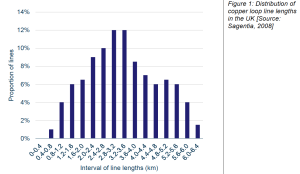
The average line length of Openreach’s network is around 3.4km. The average length from street cabinet to a premises is around 420m. This is enough for 40Mbps download speed provided BT implements vectoring on its VDSL lines. Not every line in every cabinet is being so enabled in its next generation roll-out, and at least 10% of cabinets are unlikely to be enabled.
Openreach, BT’s network infrastructure division, redacts its line length information in recent public documents. However, in a 2011 report on line lengths and line costs to Ofcom, Analysys Mason said that BT had confirmed (in 2004) that its average line length (between the exchange and the premises) was 3.47km (including the dropwire length). “This provides a reasonably good reconciliation with the (2008) Sagentia analysis (3.34km average line length). The same presentation also confirmed the distribution of lengths between the cabinet and the customer, with a typical 420m length and a small proportion of lines (10%) with a very long length,” it said. Analysys Mason later calculated the average Openreach line length at 1.704km – a figure hotly disputed by Openreach.
A 2011 White Paper by Alcatel-Lucent on the use of vector technology with VDSL2, the technology chosen by BT for its next generation broadband roll-out, found that at 420m, the average download speed would be about 40Mbps, while at 1.2km, it would drop to about 24Mbps (see graph).
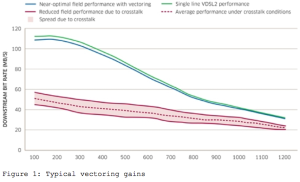
How broadband peters out. Source: Alcatel-Lucent http://bit.ly/OO9Ovy
Figures from the Office of National Statistics show a declining trend in the construction of communications infrastructure (see graph). The ONS figures include post office buildings and sorting offices, but also exchanges and cables. This suggests that few new cables have been laid in the past 15 years, so Sagentia’s figures are likely to be reasonably accurate.
(Unfortunately, the ONS bundles sales figures for telecommunications equipment with those of computers. This makes it impossible to establish accurately what UK network operators have invested in network hardware and software.)
As noted earlier, Openreach’s capex has been steady at around £1bn for several years. But it is starting to decline as it comes to the end of its “commercial” broadband roll-out to cover two-thirds of the population, but only one-third of physical UK.
In BT’s case, Alcatel-Lucent appears to have made a convincing argument to go for vectoring over VDSL2. It said, “Reusing existing infrastructure reduces investment costs and risks. It also helps with eco-sustainability targets. With VDSL2 Vectoring, you can deliver higher speeds at about 1/3 the cost of deploying fibre. And any fibre investments to support VDSL2 Vectoring lower costs for future fibre deployments.”
But as its own figures show, this is true only where line lengths are short, and it does not appear to include any offset for reclaiming the copper and reusing the ducts.
DBF members Alex Pratt and Frank Nigrello, who represent local enterprise partnerships in Buckinghamshire and Oxfordshire respectively, accuse Ofcom of painting an “unduly rosy picture” that serves the UK badly. “It amounts to institutional denial of the need for a significant change in policy towards investment in digital infrastructure. It is leading to an unnecessary rapid regional and national decline in our relative productivity and competitiveness. It is akin to adding extra weight to handicap our businesses in what the prime minister has called ‘The Global Economic Race’.”
The DBF is highly critical of what it sees as the government’s casual approach to broadband. “Current government policy and funding has failed to bridge the superfast broadband infrastructure deficit for 35% of the UK,” it says. It attributes this to a lack of consultation with user communities; adopting the “least ambitious targets and technological means” to deliver them, and to a lack genuine incentives for investment in future-proof high speed broadband networks.
Quoting from the National Audit Office report on the rural broadband roll-out, the DBF said, “The department (of culture media and sport said) its aim was to achieve the most possible with the given funding, not to lever the maximum amount of private investment.”
It added, “The current argument between Ofcom and mobile networks on spectrum fees, with the latter threatening to reduce 4G coverage unless fees are lowered, points to a far less investment friendly approach in the UK.”
The DBF report also criticises the lack of ambition in making high speed broadband a universal service. Again quoting the NAO report it said, “The effect of designing a programme which only reaches 90% of the target area will make it more expensive at a later stage to cover the final 10%. It will also make it less commercially viable for anyone other than BT to bid, as no-one else will have existing infrastructure to bolt it on to.
“Matters are made worse by the fact that BT is preventing local authorities from publishing plans showing which areas will not be covered, which would enable other, often community-based consumers, from filling the gap and ensuring 100% coverage.
“Witnesses from the broadband industry told us that potential investment by competitors had been lost. For example, UK Broadband has spent none of the £150m it had allocated for the programme. Fujitsu had also stated an intention to invest £1.5bn which has not been invested. In total, INCA estimated that the investment that had been foregone was at least £2.7bn.”
The DBF calls for a national broadband plan and responsibility for its delivery to be moved the department responsible for business and enterprise.
“Any incoming government in 2015 should be specifying a target of at least 100Mbps for the UK ‘have nots’ within two years,” it says.
It called for the UK to re-establish its world lead in mobile communications by “adopting an ambitious ‘can do’ approach to 5G technology”. 5G networks offer the prospect of universal ultrafast (1Gbps) broadband across the UK, it said.
It also called for changes to the terms of the 4G mobile licences to ensure that the coverage obligations include a signal strong enough to deliver 10Mbps inside a home for 98% of the UK population, a voice service, and for more than one 4G mobile network to have the above coverage obligation.
The meeting takes place on 24 March at 15.10-17.00 in Committee Room 4A, House of Lords, Westminster.
The agenda is:
* Welcome and introduction by Lord Erroll, DPA chairman
* Presentation of European Internet Foundation’s (EIF) report ‘The Digital World in 2030: What Place for Europe?’ by Peter Linton, advisor to EIF board of governors and co-author of the report
* Presentation of Digital Business First’s report “The UK’s enduring broadband deficit: A divided nation – Time for an effective plan” by Alex Pratt, chairman Buckinghamshire Business First and Buckinghamshire Local Enterprise Partnership (LEP).
* Comments by Stephen McGibbon, EMEA regional technical officer, Microsoft; Peter Olson, president of Digitaleurope and head of European Affairs, Ericsson; Alexandra Birtles, head of external communications, TalkTalk Group; and parliamentary contributions with closing remarks by James Elles, MEP and EIF co-founder.
Show us the money, PAC’s Hodge warns contractors
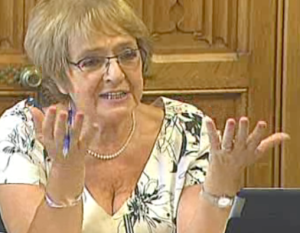
PAC chairman Hodge – ‘There is a lack of transparency and openness around government’s contracts with private providers’.
A government report into private contractors who deliver public services has suggested the government is to blame for the lack of transparency that has led to serious shortcomings in value for money for taxpayers.
“These failures have exposed serious weaknesses in the government’s ability to negotiate and manage contracts with private companies on our behalf,” public accounts committee chairman Margaret Hodge said at the release of the PAC’s report on private contractors and public spending. The report may have implications for contracts worth £1.4bn BT has signed with county councils to deliver next generation broadband.
The PAC report looked at contracts with G4S, Atos, Serco and Capita. Some, such as the G4S and Serco contracts to tag prisoners electronically, and G4S to supply security to the 2012 Olympics, have become notorious for their abuse of the spirit of partnership, in particular for over-charging.
“There is a lack of transparency and openness around government’s contracts with private providers, with ‘commercial confidentiality’ frequently invoked as an excuse to withhold information,” Hodge said.
The PAC earlier identified these traits in the BT contracts, all of which are subject to non-disclosure clauses and restrictions on speed and coverage details and financial information.
“These failures have also exposed serious weaknesses in the government’s ability to negotiate and manage contracts with private companies on our behalf,” Hodge said.
“It is vital that parliament and the public are able to follow the taxpayers’ pound to ensure value for money. So, today we are calling for three basic transparency measures:
- the extension of Freedom of Information to public contracts with private providers;
- access rights for the National Audit Office; and
- a requirement for contractors to open their books up to scrutiny by officials
“The four private contractors we met – G4S, Atos, Serco and Capita – all told us they were prepared to accept these measures. It therefore appears that the main barriers to greater transparency lie within government itself.”
Hodge said an absence of real competition had led to privately-owned public monopolies that had become “too big to fail”.
Small and medium enterprises (SMEs) had been crowded out by the complexity of the contracting process, excessive bureaucracy and high bidding costs.
Contracting had led to the evolution of privately-owned public monopolies, who largely, or in some cases wholly, relied on taxpayers’ money for their income. “The state is then constrained in finding alternatives where a big private company fails,” she said.
“We intend to return to this issue. Government is clearly failing to manage performance across the board, and to achieve the best for citizens out of the contracts into which they have entered. Government needs a far more professional and skilled approach to managing contracts and contractors, and contractors need to demonstrate the high standards of ethics expected in the conduct of public business, and be more transparent about their performance and costs,” Hodge said.
“With the government choosing to contract out more and more public services to the private sector, these issues become ever more important. This report is intended as a recipe for better services, better governance and greater openness. We hope the government will take heed of our recommendations.”


